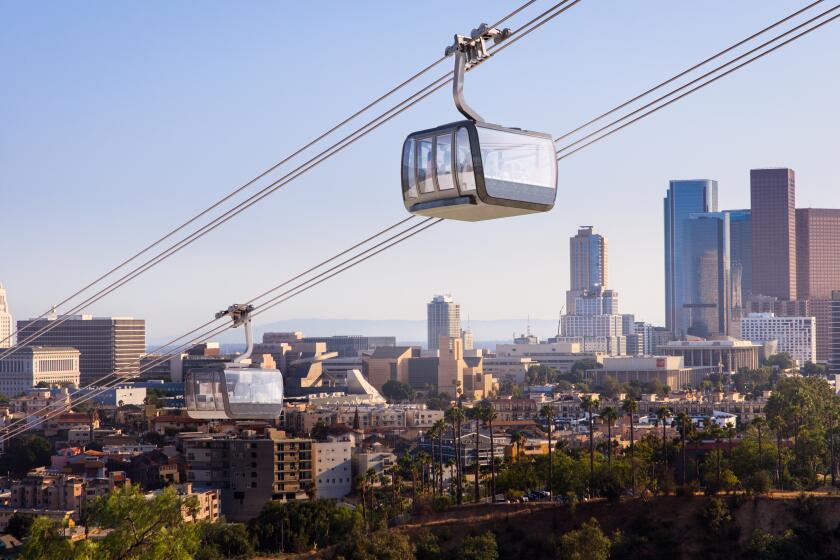Lawsuits, political backlash: Dodger Stadium gondola faces more roadblocks

- Share via
Developers of a proposed gondola from Union Station to Dodger Stadium have run into a legal and political backlash as they try to get their 1.2-mile aerial line over Chinatown completed before the 2028 Olympics.
A group of environmentalist and community activists sued the Los Angeles Metropolitan Transportation Authority on Monday over its approval last month of a “fatally flawed” environmental review of the project, and implied the city of Los Angeles should have done the report.
The Los Angeles Parks Alliance is asking the court to throw out the analysis so the “appropriate” agency can complete it.
The lawsuit in Los Angeles County Superior Court came days after the Los Angeles City Council approved a half-million-dollar traffic study aimed at delaying the project. Proposed by Councilwoman Eunisses Hernandez, who represents Chinatown, the motion requires the City Council to consider the results of the study before issuing permits or making decisions on land use.
“It’s a one-two punch to force them to do the right thing,” said Jon Christensen, founding member of LA Parks Alliance. “I don’t think the project will survive real scrutiny.”
The project, first proposed by a company funded by former Dodgers owner Frank McCourt, is expected to cost up to $500 million and has split many residents in Chinatown. Zero Emissions Transit, the nonprofit responsible for the project, has touted it as a way to alleviate crushing traffic during Dodger games.
McCourt co-owns the lots with the Dodgers’ owners, and opponents have long believed the primary reason he was pursuing the gondola was to eventually develop that land into commercial or residential space.
ZET said there are no development plans in the works.
“Unfortunately, lawsuits from opponents have become the norm for major infrastructure projects,” said Nathan Click, spokesperson for Zero Emissions Transit.
This is not the first legal attempt to slow the project. The California Endowment, a charitable foundation, filed a petition for writ of mandate in Los Angeles County Superior Court in 2022 contending the agency fast-tracked the project without public vetting in a “sweetheart deal.” A judge denied it.
Click said the developer is working with “all relevant agencies to ensure the project moves forward as quickly as possible.”
“Los Angeles is, and should continue to be, a place of innovation and creativity — a region that addresses the most pressing issues of our time, like climate change and reducing fossil fuel emissions,” he said.
The parks alliance contends Metro failed to fully consider how a gondola would spur development and how it would mar views at the Los Angeles State Historic Park where a 98-foot-high passenger station — about the height of a seven-story building — is proposed.
The lawsuit argues that because the possibility of new development around the stadium is “foreseeable,” it must be accounted for in the environmental report. But it was never considered by Metro or its executive board — now headed by Mayor Karen Bass — who certified the analysis.
As evidence that Metro anticipated the development, the lawsuit points to a flurry of gondola project requirements tacked on by the Metro executive board, including that affordable housing be part of any such development.
Metro spokesperson Dave Sotero said the agency does not comment on pending litigation.
The proposed Dodger Stadium gondola goes before the Metro board as the fight for community support intensifies at William Mead Homes, a public housing project on the edge of Chinatown.
Environmental impact reports are required for most large projects in California. The studies aim to show the costs of traffic, pollution and noise that can come with projects like the gondola, where cabins will swoosh by every 20 seconds carrying up to 5,000 people an hour to the stadium on game days.
Metro made a deal with developers to be in charge of the environmental reviews, with no clear public record of the agency negotiating with the city over the issue, the lawsuit said.
The alliance, made up of advocates for the park and community — including California State Park Rangers and Friends of the LA River — says the station stop, one of three, would take away 2 acres of hard-won land from the State Historic Park, ripping out trees and displacing wildlife.
The 32-acre park opened in 2017, thanks in part to $20 million in bond funds from voter-approved Proposition 40, after a decades-long battle with the city, which first wanted to create a warehouse center there.
“We think it’s an environmental injustice to take ... hard-won, long-sought public parkland for a private commercial enterprise,” said Kathleen Johnson, executive director of Los Angeles River State Park Partners.
“I don’t think L.A. Metro officials understand just how invasive this project is. It will become an eyesore, ... destroying a vital urban green space that provides respite in an already overburdened neighborhood,” she said.
Times staff writer Jenna Peterson contributed to this report.
More to Read
Sign up for Essential California
The most important California stories and recommendations in your inbox every morning.
You may occasionally receive promotional content from the Los Angeles Times.















